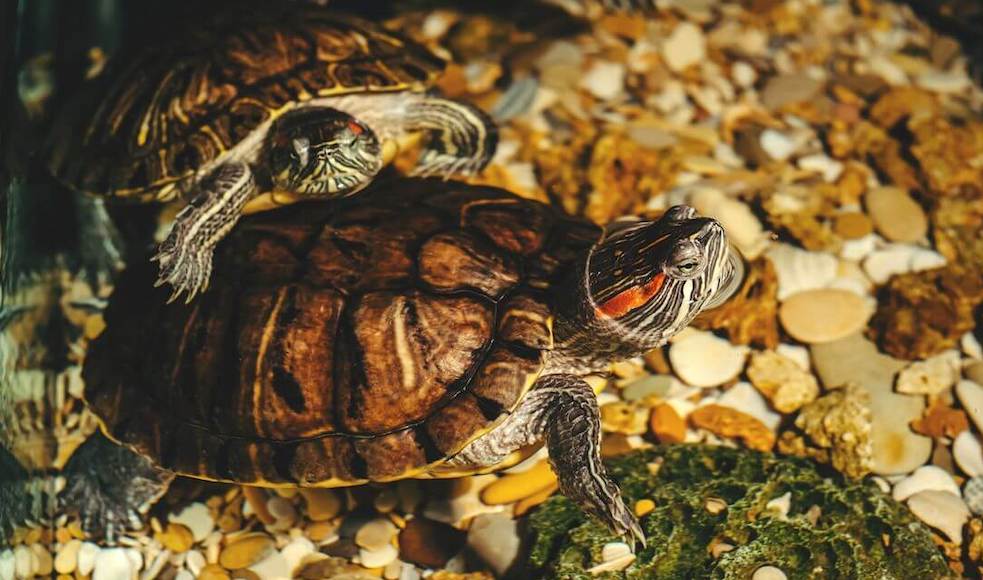If you are one of the many people who love aquariums, you probably understand the joy that comes from having a turtle tank. However, it is essential to note that if you are the owner of aquatic turtles, there are several extra steps that you will need to take to ensure that the turtles have a suitable home. Apart from minimizing odors and filtering out toxins, it is also imperative that the tank’s water is kept moving and keep an eye on the chemicals in the tank to ensure that the water quality is not affected. In general, a turtle tank filter is different from other types of aquarium filters in that it is bigger and a lot more powerful.
As long as turtles are take out of their natural habitat, they need a suitable home. In this case, a turtle tank will be a perfect choice. And, because they are marine species, just like fish in a fish tank, they eat and defecate fecal matter in the tank. That fecal waste will cause toxins accumulation, which creates the perfect breeding environment for bacteria and the resultant alteration of pH levels in the water. The result will be that the turtles will be poisoned or even killed.
It is therefore imperative that you make sure that the turtle tank is always clean. To do that, you will require a good-quality filtration system. That way, you can be confident that the tank will always be clean and odor-free to let your turtle thrive in the perfect environment.
Best Canister Filters for Turtle Tank
Because there are so many types of canister filters to choose from, it can be quite tricky to pick the right one for you. The following is an all-inclusive guide for selecting the most suitable canister filter for your turtle tank.
1) Fluval External Canister Filter
Fluval offers various good-quality filters, and the Fluval External Canister Filter is one of their best filters. It comes in various sizes, perfect for any size aquarium, from small tank hobby aquariums to the biggest commercial ones.
It is ideal for tanks that can hold as much as 100 gallons of water with an average flow rate of 1450 LPH (383 US GPH).
The Fluval 406 Canister Filter features a distinct square shape, which can carry up to 50% more water than round canisters of the same size. It improves the flow of water through the complex cleaning channel. The filter also boasts of several filtration baskets that have the correct media for chemical and biological filtration.
This filter’s features include the fast-change mechanical media, which reduces stress when replacing the filtration medium, and the Aqua-Stop Valve, which helps manage the water flow. There is also a precision-engineered motor whose function is to minimize the noise and vibration associated with the filtration process.
Pros:
- Easy installation and effective use of space.
- Improves water flow.
- It comes with lift lock clamps and Aqua Stop Valves to avoid leaking.
- Works well in both fresh and saltwater .
- 3-year warranty.
- Features a dual-layer foam screen as well as a clog-proof intake strainer to prevent leaks .
Cons:
- Relatively larger than previous models .
- Utilizes more electricity.
2) Penn Plax Cascade 1500 Canister Filter
This type of filter has a capacity of up to 200 gallons and a flow rate of up to 350 gallons. It is easy to install, and the material used to make the filter is a hard plastic that is easy to clean and long-lasting.
It also has various filter stages which the owner can alter based on personal preferences, making it the best choice for turtle enthusiasts.
This filter features an upright design suitable for transmitting water via the media trays with clean water coming out the other end. The water rate remains high because it is sealed effectively. You can also customize the trays using different media pouches.
Another useful feature is the 360-degree rotational valve system. With this feature, you will not have to worry about placing the filter in the perfect spot. Aquarists can install the filter in any area with the hoses still reaching the tank.
Pros:
- Rigid construction and luminous casing .
- Trays are easy to remove .
- Simple installation.
- No noise or loud vibrations.
- Rotational valves.
- Simple setup.
- Works fast .
Cons:
- Costly.
3) Marineland Magniflow Canister Filter
Another reputable brand when it comes to fishkeeping water filters is Marineland. It comes with three stages of filtration as well as a 100-gallon capacity. It is also more reasonably priced when compared with other popular brands.
Installing the canister is also a straightforward process, and the filter is easy to clean up because you can set it up and disassemble it swiftly. It also doesn’t make any noise and water is cleared rapidly. It features big media baskets that customize for mechanical, biological, and chemical filtering. There is also a polishing filter pad, which removes fine debris, and Black Diamond Carbon stops discoloration and releases unpleasant odors in the water.
Pros:
- No-bypass.
- Big storage capacity.
- Filter trays are stacked.
- Excellent for turtle’s tank.
- Reasonably priced.
- Numerous medium options.
- Simple to use and set up.
- Effective.
- Best choice for a turtle’s tank.
Cons:
- High chances of leaking if the gasket ring is loose.
Buyer’s Guide: Difference Between A Fish Tank and A Turtle Tank

Because both tanks are aquatic, they have many similarities. But it is important to note that you will be dealing with creatures that are entirely distinct from each other in terms of their behavioral patterns.
Before you decide to keep a turtle in an indoor tank, you should know that because it is generally bigger when compared with fish, it will eliminate more waste, making it messier. If you are taking care of a turtle, make sure that you go for a 50-gallon tank, and the tank must also have plants and fish. Because the tank is generally bigger, you should also opt for a filter that can filter and circulate a lot of water. In other words, make sure that you choose a filter that is powerful enough to filter 50 gallons or more of water.
Why Choose a Canister Filter for Turtle Tank?

The fact that turtles excrete a lot of waste means that they require potent filters. The filter must have the capacity to adequately circulate the water in the tank so that the temperatures remain constant and prevent algae growth. If you make the mistake of using a poor-quality filter, it will not be long before the tank’s water is unhealthy for the turtle.
What you need is a canister filter. It is the filter that comes highly recommended by professional aquarists. This filter has the following benefits:
1) Strategic Mounting
These quality filters can mount below the tank. The aquarists are generally placing the filters inside a cupboard, which is not visible when you view the tank. The benefit of that is that you will have more space inside the aquarium, and the aquarium itself will be more visually appealing. The extra space will also allow you to include more decorative elements in the tank.
2) Filtration Capabilities
Depending on the model you choose, canister filters generally boast every filtration method, all in one compact-sized contraption. The methods of filtration include biological, chemical, and mechanical filtration. So, you have an option to combine the different modes of filtration in a single canister if you wish to do so. Combining the various filtration methods is highly recommended for those with two or more turtles in their tanks.
These types of filters are the perfect choice for getting rid of particulates and contaminants because, through the use of pressure, they can force water via what is called the media. If the media you have is not the correct type or volume, you can change it.
3) Multiple Mediums and Stages of Filtration
With canister filters, you will also benefit from using multiple mediums, and you will also have more than three stages of filtration.
For instance, in stage one, you can choose mechanical filtration through a sponge. In the second stage, you can choose chemical filtration using activated charcoal or crushed coral. With these filters, you can also use any medium of choice and replace the mediums as desired.
By tweaking things along the way, you will be able to keep a healthy tank.
4) Quiet Operation
An issue of concern amongst some aquarists is the noise typically associated with some filters that run on motors. Fortunately, the larger percentage of canister filters that you will find on the market today do not make a lot of noise, even though they are beneficial in filtering tanks.
5) High Flow Rates
One of the best indicators of efficiency in a filter is the high-water flow rate. Canister filters provide fast filtration because they usually have flow rates that are above 100GPH. Different models will have different flow rates.
Conclusion
Even though canister filters are big and a bit pricey, they are the best choice for those planning on having an indoor turtle aquarium. And, although there are many canister filters to choose from, the moment you find the perfect type for your tank, you can be sure that you will not regret having an indoor turtle aquarium. Your turtle will also have a filtered and healthy home.




